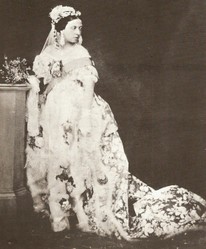Many people have names that end in ton, ham or wick. There are also many people whose name ends in ing. These are all English names, so if you have one of these names in your family, you might be able to find out where your ancestors came from. You might also be able to tell what they did for a living, as some English surnames are occupation names. Others might indicate whose son you were,

English Surnames
by frankbeswick
Many people of English descent have derived their names from the places where their ancestors lived
Beswick
Many English surnames are the place names of where your ancestors lived. I might as well begin with my own surname.The name has a typical Anglo-Saxon pattern, a personal name followed by an identifier of the type of place that it was. Beswick has changed its spelling over the years, from Beacswycke to Bexwycke to its modern version. There are two Beswicks in England, the Yorkshire Beswick. which is on the North York Moors, and the Lancashire Beswick, which is in Manchester. I am a Lancashire Beswick. The name began sometime before 1320. I know this because the Victoria History of the County of Lancashire states that when John Beswick died in 1320 there were three distinct, well established and geographically separate Beswick families in south Lancashire.[John only merits a mention because he was in a property dispute with the Cistercian monks.] They must have had time to become established, so the name must be older than 1320. It means Beac's wick, Beac or Beck being an Anglo-Saxon personal name and a wick being an economic enclosure, probably a sheep or dairy farm. So it seems that my ancestors were sheep farmers. The ending "worth" is said to be the same as the ending "wick." Bestwick is thought to be a derivation of Beswick.
Ton and ham are common place name endings in England. Ton is a form of the ancient Celtic dun, which is walled farmstead, from which we derive the word town. Ham means home and is an unfortified steading. A stead or steading is a landholding, like a farm, as is Shaw, which means an estate. But we often see ing in front of ton to make the ending ington or ingham. Ing was an Anglo-Saxon family or clan name ending, so these are the dun or the ham of whatever family whose name it is.Washington is the ton of the Washing family. Note that the ing endings are among the most ancient surnames in England, and they antedate the place names rather than vice versa. We are the English. While we spell it with an E, we pronounce it with an I. The ing people!
However, there are names that indicate an occupation. I had a great great grandmother called Bickerton,after a place in Cheshire. Some people think that in Anglo-Saxon times it was the bee keeper's dun, where the bee keepers lived
Some place names in England begin with the word much, which is only found in the West country, e.g. Much Wenlock. This has no surname counterpart and is said to be a Celticized form of the word wick. These were areas where Welsh was spoken well into the modern period.
Some English place names end in chester, caster, or cester. These words derived form Castra, the ancient Roman word for a military camp. My nearest city, Manchester, was originally Mancunium Castra, the camp on the breast shaped hills. There seem to have been two gravel hills once, though they cannot be now recogniized.My own town Stretford means Street ford, where the Roman road, [Street] crosses [fords] the river Mersey. The massive dual carriageway not far from my house is Chester Road, which covers the route of the Roman road from Manchester to the ancient legionary base of Chester, and the Roman road lies below it.
Borough, bury and by are always endings that indicate a town. But by is only known in areas where the Norse settled, and is linked to similar place names in Danish, such as Brondby.
Place names
 | English place-names |
Occupation names
A variety of names originating in the mediaeval period speak of your ancestor's occupation. If you are called Fletcher your ancestor was a Flecheur, an arrow maker, But he did not make the arrow heads. that was an arrow smith. Smith speaks for itself. But one strange name is Sixsmith. I believe that this is quite old and as a Seaxa was an Anglo-Saxon sword, it means a sword maker. Note that the Saxons' name meant the sword people.
A related word is wright, which means maker. Hence we get Cartwright and Wheelwright, whose names are obvious in meaning.Yet you might be cooper or hooper. These were barrel makers. Mason also indicates your ancestor's occupation as a carver of stone. Brewer is a surname whose origins are clear. Some surnames derive from .actors in mediaeval plays, and they took the name from their role. Bishop and pope come into this category.
Some names originate in woodland craft in mediaeval England. My daughter is now Mrs Turner, and her husband's surname derives from distant ancestors who worked shaping wood in the forests of mediaeval England. They used lathes. But there were also sawyers, who sawed up the wood and foresters who defended the forests against poachers, such as Robin Hood, whose name is unclear, but it is Anglo-Saxon. Hunter and Falconer are names that indicate that your ancestors were huntsmen in the mediaeval woodlands.
Franklin is a surname that suggests that an ancestor was a free farmer rather than serf. My research into mediaeval Beswicks turns up quite a few people who seem to have been franklins, as there seem to have been several of them renting land or estates from dignitaries, such as bishops and abbots. .
Surnames
 | A Dictionary of English Surnames. by P.H. Reaney (Oxford Paperback Reference) Did you know that Batts, may have had stout ancestors? That Dennes could be descended from swineherds? That Herons might come from thin men with long legs? How much do you know ... |
Personal names
There are some old Anglo-Saxon family names still left. Perhaps a very old name is Godwin. This is an ancient Saxon name and was the surname of the last Saxon king of England. It took some courage to hang onto the name during the Norman period. Hood is an Anglo-Saxon family name found originally in the north. There is in the court annals of Wakefield, which was at the then northern end of Sherwood Forest, an entry from 1226 which states that one Robert Hood had failed to arrive in court [and was therefore an outlaw.] Interesting! He is also known as Hobdehod. Siward is also an ancient Anglo-Saxon name originating in Northumberland, and it may be connected with the word sword.
Several names derive from Normans. Corbett is one, as is Brant/Brunt. Latham sounds Saxon, but it was originally la Thom, a Norman knight who held land in Lancashire.Others derive from Vikings. I have a distant ancestor, the seventeenth century Angela Eagleland, a name which is not known in England at present, but which might be the Scandinavian Egland brought by Vikings.
You might derive your name from your father. Thus Johnson is John's son. But Williamson is Scottish rather than English. Stephenson is English, but my mother's maiden name, Stevenson, is Scottish. Robinson is a very common name meaning the son of Robert.
I have given a small sample of the huge variety of English surnames and place names. I cannot deal with them all, and indeed there are names that are unclear in their origin. A useful technique for those who want to ascertain their surname's meaning is to look at the Atlas to find if there is a place name that corresponds to their surname. This might be the origin of the name, but you should also check that there is not more than one place of the same name in England. Surnames and place names are great fun, and children in particular love to know where their name came from. Good luck in your search.
You might also like
Thinking about NalediThe new discoveries in the Rising Star cave in South Africa arouse questions ...
The History of the Wedding Dresses: From Beautiful Gowns to Wh...Wedding dresses have changed a lot over the years. The colour is the most not...
The Start of the Gregorian Calendar: The Missing 10 DaysThink the calendar you know has been around forever? Think again! In 1582, th...



 TheThousand Year Gardenon 11/26/2025
TheThousand Year Gardenon 11/26/2025
 Women of the Gospelson 10/11/2025
Women of the Gospelson 10/11/2025
 Religious Gardenson 08/25/2025
Religious Gardenson 08/25/2025
 Doctor of the Church: John Henry Newmanon 08/03/2025
Doctor of the Church: John Henry Newmanon 08/03/2025




Comments
The spell checker is at its old tricks, converting Wuffing to surfing. i annot change the word, but can draw readers attention to the error
Thank you, Frank and Veronica, for your comments below, in answer to my previous observation and question.
Frank, Your answer one comment box down advises us that "The Saxon kingdom's seem to have taken abfierce beast their eemblem. Wessex took the WhitevDragon, which became changed to the Golden Dragon."
Is the Angle kingdom's emblem known?
(Isn't it irritating the way the spell-checker inserts a "b" between "a" and "fierce" for "abfierce"; an extra "e" for "eemblem"; and a "v" between the terminal "e" and the initial "D" for the run-on "WhitevDragon"? I'd really be confused if I wended my way as an English-language learner!)
Thank you, Frank and Veronica, for your comments below, in answer to my previous observation and question.
Veronica, some online sources associate Wuffing with King Wuffa (reigned 570s?). English Wikipedia brings forth an image from Cheshire cartographer, chronologer, historian John Speed's (1551/1552?-Jul 28, 1629) Saxon Heptarchy (1611). That image clothes in red King Wuffa, who carries a blue shield.
Do we know whether displaying such colors declare -- what with Wuffa perhaps designating a "little wolf" -- some biogeographical or character trait?
Surfing probably derives from The word for wolf. The Saxon kingdom's seem to have taken abfierce beast their eemblem. Wessex took the WhitevDragon, which became changed to the
Golden Dragon.
That is why we are called English. The tribes of South Denmark whence we came often ended their clan names with ing.
Wuffings was the surname of Saxon kings of East Anglia in c 500 AD
So ings can be a Saxon name suffix
Wuffings was the surname of Saxon kings of East Anglia in c 500 AD
So ings can be a Saxon name suffix
It is more likely to be that the original clan name ended in ing, which is believed to derive from an Indo European noun meaning man. Hence ings would denote a group of men. What the name wash means or derives from is unknown.
Thank you for your comment below, on Mar 2, 2023, in answer to my previous, same-day observation and question.
The Washings family name intrigues me.
Might the Washings family have been a clan whose family name Wash monikkered the clan name -ing, for the result Washing?
Family names predate where they live. Thus Washings predate Washington. When the Angles came to Britain they retained their clan names, all of which ended in Ing, but some of them developed new names without ing. Thus the the clan structure seems to have decayed during the Anglo saxon archival